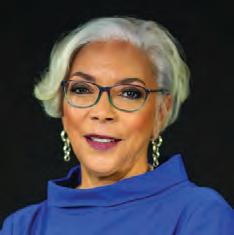





Kamala Harris took a few moments before taking the stage at the first annual Rocket Foundation Summit to talk exclusively with The Atlanta Voice about what's at stake for Black Americans this election cycle, gun violence prevention, and the continued fight for a universal ban on assault weapons, and why she loves Atlanta as much as she does.
The Vice President met with The Voice in the bowels of the Carter Center on Tuesday, June 18.
The Atlanta Voice: Good afternoon, Madam Vice President, I've come here today to speak to you about a number of things, one of which is your leadership on gun violence awareness and prevention. We talk about prevention a lot, and then we have the mass shooting that took place at Peachtree Center last week. What are we going to do about that?
Vice President Kamala Harris: There's a lot we need to do about it. First, I'll just start by saying that it doesn't have to be this way. That's part of what we want to remind everybody: that there's nothing normal about it and that we should refuse to accept it as being normal.
There are a number of things we need to do about it, there's what Quavo is doing here in Atlanta, which is about turning his pain and grief into something that is productive. There's the work that we need to do that is about helping communities that have experienced this gun violence and the trauma that comes with it. We need to help people get to a place of productive healing of their trauma.
AV: Because it doesn't end with the shooting.
KH: That's exactly right. The trauma is the injury that's invisible to the eye but can be lifelong if it's not addressed and healed. So that's about diagnosis and treatment of trauma and encouraging folks to know that it's OK to talk about it. We have to let people know that it's a sign of strength.
AV: How does voting and being an active participant in the political process, both locally and nationally, play a part in this?
KH: Elections have a lot to do with how we can address the issue. Joe Biden and I are proud that we are responsible for one of the first meaningful pieces of gun safety legislation in 30 years. We still need assault weapons bans, we need universal background checks, we still need red flag laws, and in order to get to that place, we need members of the United States Congress who have the courage to take a stand. We're not trying to take everybody's guns away. It's about rea-
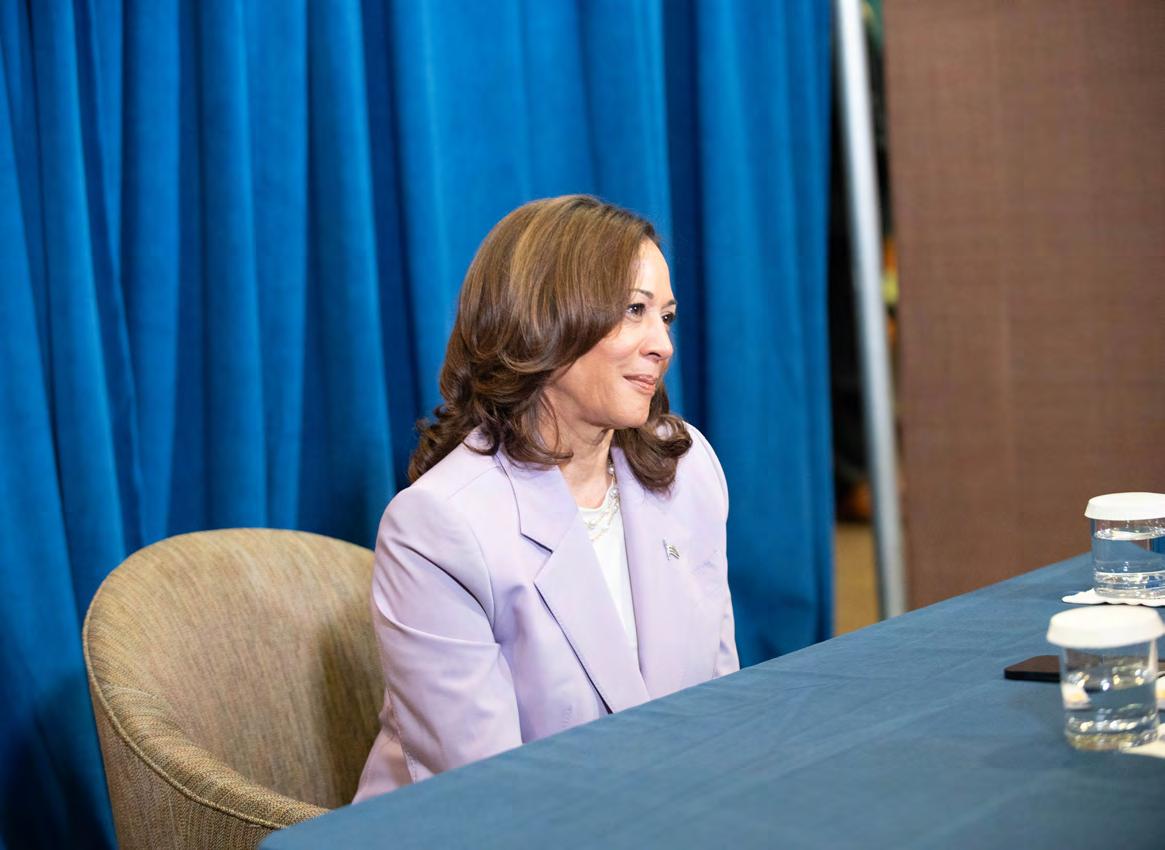
sonable gun safety.
AV: What's at stake for Black voters this election? It's always personal, but it feels more personal now.
KH: I think that this is one of the most significant elections of our lifetime. You look at it on the fact that do we want to have a President of the United States who is focused on fixing problems or making problems? Do we want a President of the United States who dealt with the longstanding issue of the high cost of insulin for diabetes patients? Black folks are 60% more likely to be diagnosed with diabetes.
AV: Particularly in the south.
KH: [agreed] And most of them are in the south and too many of our seniors had to make a choice between filling their prescriptions or filling their refrigerators. We have for the first time, capped the cost of insulin at $35 per month. That's a game-changer. This is something I would say to your readers: this is about a senior, a grandmother a grandfather, or an auntie, so even if you're a young
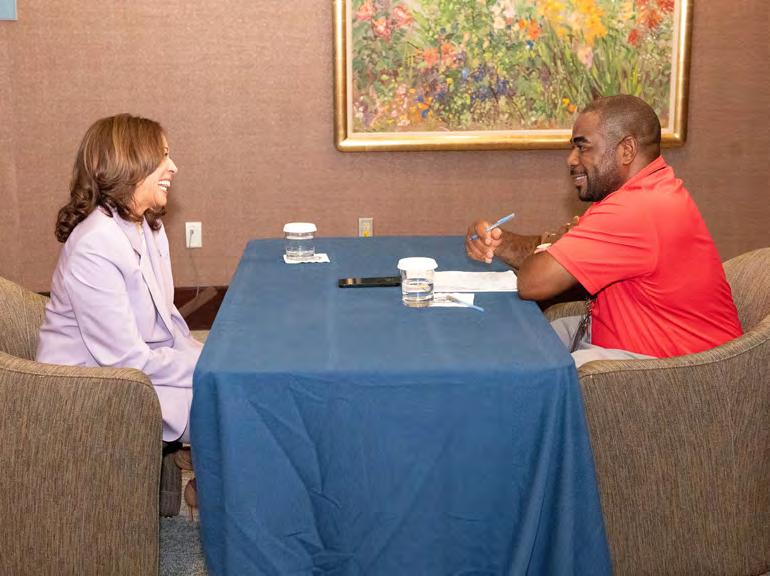
Continued from page 2
person, this affects people in your life that you love. It's about understanding solutions. When people think about what's at stake in this election, think about the kinds of decisions that Joe Biden and I have made which is about seeing where people are and dealing with longstanding problems. Do you want that kind of approach or do you want someone who openly talks about how he's going to weaponize the Department of Justice against his political enemies? Somebody that talks about how he's going to be a dictator on day one and used awful words to describe African countries and people that come from there.
AV: He's used awful words to describe Atlanta too.
KH: And to describe my home city of Oakland, and Detroit and Milwaukee. What do those cities have in common?
AV: They have majority Black populations.
KH: Like Maya Angelou tells us, listen to people when they tell you who they are.
AV: Has Atlanta and Georgia as a whole, become the Biden-Harris administration's personal battleground state? I have covered you for years, but it feels like I am covering you every week these days.
KH: I've been coming to Atlanta for years.
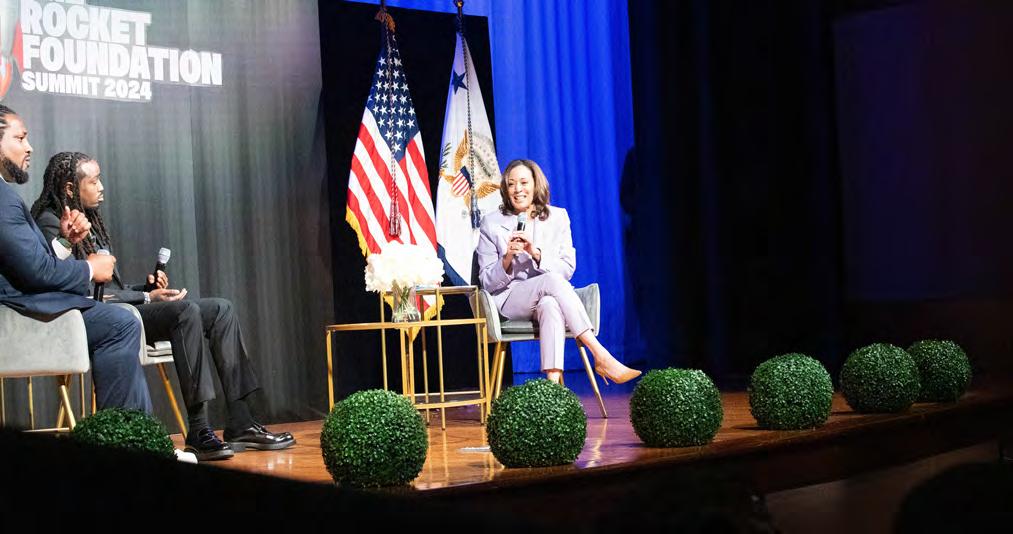
I feel at home in Atlanta. Atlanta has always treated me like a daughter in terms of my earliest days of coming here. There's so much history here. I don't think there's a Black elected official that doesn't feel that way when they come to Atlanta.
AV: Lastly, why do you feel like the Trump campaign hasn't come to Atlanta and spoken to voters here in Georgia as much as you and President Biden have?
KH: I'm not trying to get in that head. But I will say this, no voter should be taken for granted. Part of the reason I come back to Atlanta is because I love Atlanta. It's important to recognize the people that live here and the people that have always been leaders here. I'm traveling all over the country because I feel very strongly that we have to earn people's votes. I'm not taking any voter for granted. That's about respect. If you respect the
on Tuesday. On Friday, June 14
intelligence of voters you understand that you have to earn that vote.
AV: I guess it isn't smart to just assume you will get the same level of support election after election?
KH: And don't assume that people are going to fall for the okey-doke.
AV: Like having a rally in the Bronx.
KH: Or going to a Black church not on Sunday when the congregation is there.



“What the people want is simple. They want an America as good as its promise.” — Barbara C. Jordan
When I started
T.H.R.I.V.E.
Christian Academy in 2013 with just two first graders, I didn’t imagine that within a decade it would be a fully accredited K-12 school with over 300 thriving students. While I’m proud of our work at T.H.R.I.V.E. and know that we’re empowering children to achieve their full potential, I believe our radical and tremendous growth is proof that parents are looking for alternative education options.
Kids are unique. They have different interests, abilities, gifts, and challenges; what works well for one child may not work for another. Schools and educators have the burden of adapting instruction to fit the educational needs of each child while also empowering them towards success. That’s why education freedom is essential for a society that cares, not only for each child, but also about the future. And here in Georgia, we care!
Senate Bill 233 (SB 233) is proof of that. It makes permanent the teacher pay raises that have been given over the past six years and allows public schools to use capital outlay dollars for building Pre-K facilities. The long overdue SB 233 allows low-performing and underfunded public school students to transfer to other public schools outside their home districts, opening new education options for students statewide. It also provides additional funding for schools in the bottom 25% to help them address student needs.
Additionally, SB 233 creates a highly targeted Education Savings Account (ESA) pilot program, the Georgia Promise Scholarship, which has the potential to provide quality education options to students who need them the most.
ESA legislation has been passed in several states recently, and a flurry of innovation has followed. From microschools to specialized private schools, parents are strategically using their children’s

education funding to ensure their child’s potential evolves into academic success. By putting the decision-making as close to the kids as possible (in the parents’ hands), each child can get exactly what he or she needs to thrive. Thanks to SB 233, Georgia parents now have the power to spend their voucher on private school tuition, home-schooling supplies, therapy, tutoring or even dual enrollment for their high schooler. With SB 233, the students attending the lowest performing (bottom 25%) of public schools in Georgia will be able to get a scholarship to attend an accredited school of their parents’ choosing. The bill prioritizes students from families below 400% of the Federal Poverty Level (the same threshold for Obamacare subsidies). These are the Georgia students who are most vulnerable. If we can help them get the educa-
tion they need, we can lessen the likelihood of cyclical poverty and help them achieve their academic standards, exceed the stereotypes of their context, and achieve their personal goals.
Based on the testimonies of students who have transferred to T.H.R.I.V.E. Christian Academy, I believe parents across Georgia will be thrilled to access educational options. We can give account upon account of students and parents who have come to love their education freedom afforded by SB 10, the Georgia Special Needs Scholarship signed into law in May 2007. Our 100% graduation and 100% college acceptance rates prove that the combination of education freedom funded by scholarships paired with passionate educators produces both scholars and good citizens.
Parents of special needs children across Georgia have enjoyed
having more control over where their children spend their days and select classroom sizes and curricula that are best suited for their learner. Now this education freedom has been extended to parents of general education students as well. The stories of success will skyrocket.
I’m incredibly encouraged by the broadening of K-12 education options and scholarship-funded opportunities in Georgia. I extend my gratitude on behalf of education entrepreneurs, the guardians of students in low-performing schools, and Title I students across Georgia – we thank the Georgia legislature for listening to the voices of all and making the decision that secures our bright future.
Monica Hall is the founder of T.H.R.I.V.E Academy and a McLeod Society Fellow at Black Minds Matter.
FOUNDED May 11, 1966 FOUNDER/EDITOR
Ed Clayton Immortalis Memoria PUBLISHER/EDITOR
J. Lowell Ware
Immortalis Memoria
The Atlanta Voice honors the life of J. Lowell Ware.
PUBLISHER
Janis Ware
jlware@theatlantavoice.com
PRESIDENT/
GENERAL MANAGER
James A. Washington 2018-2024
EXECUTIVE ASSISTANT TO PUBLISHER
Chia Suggs csuggs@theatlantavoice.com
EDITOR IN CHIEF
Donnell Suggs editor@theatlantavoice.com
GENERAL ASSIGNMENT REPORTERS
Isaiah Singleton isingleton@theatlantavoice.com
Laura Nwogu lnwogu@theatlantavoice.com
EDITOR AT LARGE Stan Washington swashington@theatlantavoice.com
MANAGING EDITOR, DIGITAL Itoro Umontuen iumontuen@theatlantavoice.com
ADVERTISING, SALES & CIRCULATION
ADVERTISING ADMINISTRATOR
Chia Suggs
advertising@theatlantavoice.com
CIRCULATION MANAGER
Terry Milliner
SALES
R.D.W. Jackson rdwadman@gmail.com
Dequarius Jones djones@theatlantavoice.com
SUBMISSIONS
editor@theatlantavoice.com
DIRECTOR OF PUBLIC RELATIONS
Martel Sharpe msharpe@theatlantavoice.com
CONTACT INFORMATION 633 Pryor Street, S.W. Atlanta, GA 30312 Office: 404-524-6426 info@theatlantavoice.com

SPIRITUALLY SPEAKING
 BY JAMES A. WASHINGTON The Atlanta Voice
BY JAMES A. WASHINGTON The Atlanta Voice
I’m sure I’ve written on this before, but I thought the significance of obedience was important enough to repeat here. It occurs to me that obedience to God is an exercise in ‘want to’ as opposed to ‘have to.’ The analogy given in church is simple enough. When parents enforce rules and discipline with regard to their children, if the child is to respond out of respect and love, a true relationship must exist between parent and child. If a wholesome relationship does indeed exist, then the child’s love for the parents will result in that child wanting to comply.If all one does is obey the rules because of the consequences and punishment associated with disobeying the rules, then the rules generally get thrown out the window when the rule maker is no longer around. I guess what I’m saying is that when grounded in love, people want to respond favorably according to the wishes and will of the person who is the object of that love. By our very nature we want to look good in the eyes of someone we’re trying to impress. Jesus says,“If anyone loves me,he will obey my teaching.”John 14:23.Ex-
“If anyone loves me,he will obey my teaching.”John 14:23
amine this use of the term obey.What Christ is saying is the same thing that any mother and a father believe about their kids. First and foremost, we all know the things that would upset Mom and Dad. We know this because they have spent a lifetime (yours) instilling values and integrity into your character. You might still do things they wouldn’t condone, but you certainly know the difference between the right and wrong of it because of your upbringing.That upbringing, if nurtured in the spirit of love, reveals to all of us the source and nature of the consequences and the resulting discipline. It’s love. We are all familiar with that ‘this is going to hurt me more than it’s going to hurt you’ thing. Christ is merely reminding us that if you love Him, then obeying His rules, His teachings, which were given to us out of love of the Father, should come from the heart. Our desire to please should
“YOUR VOICE”
override our mere compliance to the rules. The point is obedience to God has so much more to do with wanting to do the right thing for the right reason, than doing the right thing because it is law. One is the result of a relationship and the other is the result of fear of consequence.
If all one does is obey the rules because of the consequences and punishment associated with disobeying the rules, then the rules generally get thrown out the window when the rule maker is no longer around.
Throughout scripture, Jesus constantly refers to the love of the Father. How many of you do what your mother would expect of you and your mother has been dead for many a year? How many of you pass those same expectations along to your kids? Why? I submit that you do this because of
the relationship you have/had with your mother.That’s why I’m convinced that the key to understanding obedience to God is establishing, or for many of us re-establishing, a relationship with the Almighty.This is achieved by studying His Word, getting inside of His commandments and examining the life of Jesus Christ, who because of a love thing with His Father, carried out His Father’s wishes to the letter. “I will not speak with you much longer, for the prince of this world is coming. He has no hold on me, but the world must learn that I love the Father and I do exactly what my Father has commanded me.” John 14:30-31. To obey should be an act of love. Our goal should be to understand God’s love for us and to simply do our best to return it; act accordingly, so to speak. May God bless and keep you always. This column is from “Spiritually Speaking: Reflections for and from a New Christian” by James Washington. You can purchase this enlightening book on Amazon and start your journey towards spiritual enlightenment.
What did you learn about Juneteenth growing up, and are the children learning more today?
 EBONY GREENE Decatur
EBONY GREENE Decatur
“Growing up, I didn't learn anything about Juneteenth. I didn't know Juneteenth was a thing until I was maybe 19 or 20. I learned about it in college, so I think that children these days are probably learning a lot more about what Juneteenth is, especially because Juneteenth is now nationally or, you know, recognized as an official holiday, as well as the exposure to social media, and people discussing their history, true black history. So I think children are learning more about Juneteenth than I did because I didn't learn anything.”
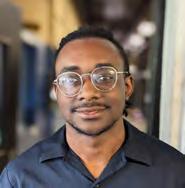 DIVANTE WRIGHT Lithonia
DIVANTE WRIGHT Lithonia
“Growing up in school, Juneteenth wasn't like a thing we talked about, not even during Black History Month. So I would say kids nowadays are probably going through the same educational struggles that I went through just because the education curriculum nowadays is more strict than when I was in school. So Juneteenth, if it wasn't talked about, then I highly doubt it's being talked about now.”

“I think, for those that are African Americans who are taught about Juneteenth and the significance of your culture [are taught] outside of school. Now, the question was, are the kids nowadays learning about Juneteenth? My answer is no. I do not think that it is important. I don't think the curriculum thinks it is important for the kids of the now to learn about Juneteenth. Why? I don't know, man. I think they try to keep us divided, man. You know, conspiracy theorists, man. Yeah, I'll be one of those in your little report.”

“I didn't grow up learning much about Juneteenth, but I think I'm learning more now as I understand it. I don't think it's being taught enough in school because if it was, I thought maybe I knew something about it. I would say maybe, like 2020. 2021 is when I started to have an understanding. I’d never heard of Juneteenth like I never heard it. So, probably around that time, I began to see TikToks, to be honest, of different things they would do back in the day, like cornrows being a map for people to get around, which was just a lot of stuff. So obviously, I have learned that now but not back in the day.”
Compiled by Vincent Christie.
Here are the top-selling used cars in the United States
The beats of the talking drum and Fuji music, a popular Nigerian genre, were the soundtracks of the Juneteenth groundbreaking of The Food Studio, Atlanta’s first Black-owned and 100% plant-based shared commercial kitchen. Located in the Nia Building of Pittsburgh Yards, the incubator space will help aspiring food entrepreneurs create successful business ventures and provide the community with access to healthier food options.
Its mission started with the Urban Oak Initiative, a nonprofit organization that fights obesity, diabetes, and other chronic illnesses by educating the youth on the health benefits of eating more plant-based meals. The organization, formerly Helping Hands Ministry, was founded by Robbie Towns in 1997 to address the basic needs of her local Mississippi church and community. That legacy has continued with her grandson chef Kevin McGee, executive director of the Urban Oak Initiative and founder of The Food Studio.
“We've never controlled our food systems since we've been in this country. Well, now we have an opportunity to get to control our food systems and control our own outcomes,” McGee said. “Food is the most important thing that we have. It's the only thing that can really affect everything about us mentally, physically and spiritually, so we're just excited and humbled to have the opportunity to do so.”
The studio's site is the former farmland of Clark College’s (now Clark Atlanta University) agricultural department. While doing his research, McGee said he discovered that the vegetables grown there were being served on trains that Black people were likely not allowed on. “They were farming foods that they couldn't even eat. Well, they're going to eat what we put in here.”
The kitchen will join the many initiatives and businesses in Atlanta that aim to promote a vegan, healthy lifestyle for the Black community. It will also be able to house up to 30 small plant-based entrepreneurs, some of whom were vendors at the groundbreaking.
“Atlanta has a big vegan community, but it's not always healthy. We do desserts, but we still do it in a healthy way because everybody needs a treat,” said Natasha Hickman, co-owner of Vegan’s Daughter with her daughter Nylen.
“I think having this space where people are really talking about the benefits of foods, in our community specifically because we don't tend to eat and then having healthy options [is good]. So, I like the space because we can still cook our food and it can still taste good.”
During the groundbreaking ceremony,



representatives,
“Particularly


Vice President of the United States Kamala Harris returned to metro Atlanta on the eve of Father's Day weekend. She was in town on Friday, June 14 to add her voice to a conversation about economic opportunity that was taking place during the 38th annual 100 Black Men of America conference. The vice president has immediate plans to return to Atlanta next week to discuss gun violence and gun control with former Migos rapper Quavo on Tuesday, June 18. Migos member Takeoff was shot and killed in Houston on November 1, 2022.
Georgia, and Atlanta and Fulton County more specifically, remain crucial battleground voter blocks for the Biden-Harris administration. Harris has made several appearances in metro Atlanta this year, including most recently in College Park in April to kick off the Biden-Harris Administration’s Economic Opportunity Tour. The tour has since made stops in Detroit, Michigan, and Milwaukee, Wisconsin.
Harris was back on a stage in Atlanta alongside celebrated comedian, author, and television host Steve Harvey, the afternoon's moderator, to talk about a number of subjects, including the Biden-Harris administration's championing of community banks, student loan debt relief, the power of home ownership and the need for more homeownership by Black and brown people, and medical debt relief.
``In these streets," proclaimed Harris after receiving a standing ovation upon taking the stage and greeting Harvey. Harris said she wanted to be in Atlanta at the 100 Black Men of America conference because she wanted a huge platform on which to speak about the access to capital for small businesses and home ownership.
"We want to get the word out. That's why I'm doing this tour," Harris, the first Black Vice President of the United States said.
Harvey acknowledged that he was out of his comfort zone interviewing the vice president about how she and President Joseph R. Biden have planned to even the wealth gap in the United States. "I'm like Gayle King," he joked.
"People need more than what's enough to get by, they want to get ahead," Harris explained while speaking to the capacity crowd inside the main ballroom at the Hyatt Regency Atlanta on Peachtree Street. During the time Harris was on stage and immediately after, traffic on Peachtree Street was blocked off around the Hyatt.
Harris made a point to discuss how little funding Blackowned small businesses get from venture capital funds. Less than 2% of venture capital investments are going to Black small businesses, according to data provided by crunchbase. com. That is a large drop off from the amount of money that was invested in Black-owned start-ups and small businesses in the immediate aftermath of the Black Lives Matters summers of 2020, 2021 and 2022.
Harvey went off script for a moment following Harris speaking of the changes the Biden-Harris administration has made with debt relief, for example. "I know I ain't coming back next year. I appreciate y'all having me," joked Harvey after he spoke about not wanting to hear people call his nationally syndicated radio show on Monday morning to talk about why he didn't "ask any hardball questions."
"This is not what this is about. This is an alley-oop for a dunk," he said. "This administration needs to get the word out."
Harris said the Biden-Harris administration is "addressing



the realities of what holds people back." She added that she understands that Black people, for example, do not "lack for hard work and good ideas", but the lack of funding and the lack of information on how to receive small business loans or funding can be a huge detriment.
Regarding homeownership, Harris pointed out the $25,000 credit for down payments and $400 per month credit for first-time (described by Harris as “first generation”) home owners that the Biden-Harris administration pushed forward and has made available.
"These are some of the issues we are trying to address. We have to give people the opportunity to compete," Harris said. "That's what this is about."
Harvey asked Harris what advice she would give to the
young people in the room and Harris said she wanted them to know that when they are in the rooms where decisions are being made, they should know that the elder generation is in the room with them.
"You must dream with ambition. Don't ever let anybody tell you not to have ambition," she said. "I always say I eat no for breakfast."
100 Black Men of America Vice Chairman Michael Victorian was the event MC and the Reverend Timothy McDowell III delivered the invocation, saying in part, "Bless our vice president with even more wisdom as she prepares to speak this afternoon."
Along with Harris and Harvey, there were a number of local and nationally recognized celebrities in the crowd to see and hear Harris that afternoon, including Civil Right era icon, former Atlanta Mayor and Ambassador to the United Nations Andrew Young.

Sunday was your last opportunity (unless they extend it, and they should) to see the Alliance Theatre’s World Premiere of the musical “The Preacher’s Wife” (The play ended its residency on Sunday, June 16) which is based on the popular movie starring Whitney Houston and Denzel Washington is just as good as anything you will currently see on Broadway. When it comes to grade A theater, the production checks all of the right boxes from acting to music to directing to set design. Basically, it’s an Alliance homerun.
The musical stars Amber Riley (Julia) as the Preacher’s wife; Alan H. Green (Joe Hamilton, the developer) and Donald Webber, Jr. (Dudley) as the angel sent down to help the Preacher to save his church and his marriage.
Speaking of Broadway, the production could very well make its debut there but there is no official word that the musical is being workshopped for The Great White Way according to cast member and Georgia resident Brad Raymond (Deacon Johnson). Raymond, a Chicago native who happily calls Atlanta home, now took a few minutes to talk about the pro-
duction and his successful theater career in Georgia just before he headed to the Alliance for that night’s production. This is an edited version of our conversation.
The Atlanta Voice: Was it a culture shock for you when you first moved to Georgia?
Brad Raymond: It was a little bit of a culture shock. I said, ‘Oh, I can’t go to sleep.’ There are no gunshots and sirens (laughing). Oh, wow. Seriously, like it was a lot more than what I was used to. So that the first year though, I went back up to Chicago a lot, but then I eventually really grew to love it and Georgia became home. I love the solitude and quiet. I love how unburdened it is. I do wish the politics were a little different, but that almost seems like it’s trying to change, too.
AV: Did you perform a lot in Chicago?
Brad Raymond: I did more as a teenager and as a kid in college, and then I focused in on teaching in my early adult years. I started off as the head of the music department at the College Prep High School, and then I became artistic director of Performing Arts of charter schools. So those were those very demanding jobs, and I wasn’t able to act as much as I wanted to. But when we moved down here, I took a
year off, and after that, I decided to focus primarily on performing and I’ve been doing it ever since.
AV: So what company did you first work with down here?
Brad Raymond: I worked with a small community group called Onion Man, and actually the founder of that organization took his life the year before last.
AV: After Onion Man where did you go?
Brad Raymond: .I have done several productions at Kenny Leon’s True Colors Theater. Tthe first show that I did for True Colors was “Funk”, and we did it at 14th Street Playhouse. They wanted to hire some fresh faces who hadn’t worked at True Colors before. It was a wonderful show. We had such a good time. It was well received by their audiences and by the critics. It was an adaptation of the personal story that George C Wolfe put together.
AV: Is The Preacher’s Wife being tested for Broadway? (Several other plays have been workshopped at The Alliance for Broadway.)
Brad Raymond: That is the buzz. There’s no official word about it yet, but that is the rumor. And They do have a few New York pro-
ducers involved, and so that usually doesn’t happen unless they’re thinking about trying to take the piece to Broadway.
AV: So what do you like about this stage version of “The Preacher’s Wife”?
Brad Raymond: The focus is more on the women, on Julia and Marguerite and it really being their story. I think the movie is fantastic. I love it, but we do need to hear black women’s voices in a stronger way. We’ve seen that change really start to happen in television in a wonderful way. And I think film and theater are starting to catch up with that, where black women are at the helm of big shows, and that black women are also writing and speaking in their own voices.
That’s why I think it’s so great to have Azie Dungey, you know, writing this script, to be able to bring a black woman’s perspective for this main character, which is a Black woman. So that’s one thing that I really love about it. The other thing that I love is how Tittus Burgess is able to write in such a great eclectic style. He has a mastery of all these different styles of both black music and traditional Broadway found, and it’s a nice mix that you don’t find in most musicals today or ever.

Legacy filled the room. June is Black Music Month and this year brings a special tribute to the legendary artist and Augusta native, the late James Brown.
On June 15th, Buckhead Art & Company, in collaboration with the James Brown Foundation, debuted the James Brown exhibit, “Echoes Of The Flame.” Running until June 30th, the exhibit showcases multiple artists paying homage to the iconic "Get On Up" singer.
LaMont Z. Russell, events and marketing manager for Buckhead Art & Company, explained that the idea originated with a phone call to the gallery. The proposal for the show in Buckhead was made possible through collaboration with the James Brown estate and Primary Wave, the record company that holds the rights to Brown’s music as well as music by Whitney Houston, Burt Bacharach, and Prince.
Russell highlighted the cultural importance of James Brown’s music and its connection to various genres, especially hip-hop. Brown’s pioneering work in freestyling and his broader impact on music underscored the necessity of bringing the exhibit to a city renowned for its place in the art and music worlds, “Everyone loves James Brown, especially here in the south, but also just looking at the hip- hop show that we did and how his music relates to so many other genres,” Russell told The Atlanta Voice Selecting the artists for the exhibit was straightforward for Buckhead Art & Company. They chose artists already affiliated with their gallery, focusing on those skilled in realism and depictions of people. These artists were invited to contribute their unique perspectives and talents to the exhibit. The exhibit’s alignment with Black Music Month added an extra layer of significance.
Among the featured artists is Shawn Stewart, known professionally as “Stu.” Originally from Dayton, Ohio, Stewart moved to Atlanta in 2017 with little more than clothes on his back and big dreams. Reflecting on his journey, Stewart shared that the move was driven by a lack of opportunities in Dayton and a desire to give his art a chance to flourish. Before pursuing art, Stewart had played football since he was seven years old. When his football dreams ended, he felt a void that was unexpectedly filled when he decided to create a painting for his new condo’s dining room.
Stewart expressed deep admiration for James Brown’s cultural contributions, both musically and artistically. For his piece in the exhibit, Stewart chose an image of James Brown that deeply resonated with him. The image, depicting Brown in a tracksuit and glasses, captured a different side of the artist—one of comfort and confidence, contrasting with the more familiar image of Brown as a sweaty, cape-clad performer. “James Brown represents a golden age of music, laying the foundation for future generations of African American artists to express themselves creatively,” said Stewart.
Veteran Buckhead Art & Company artist
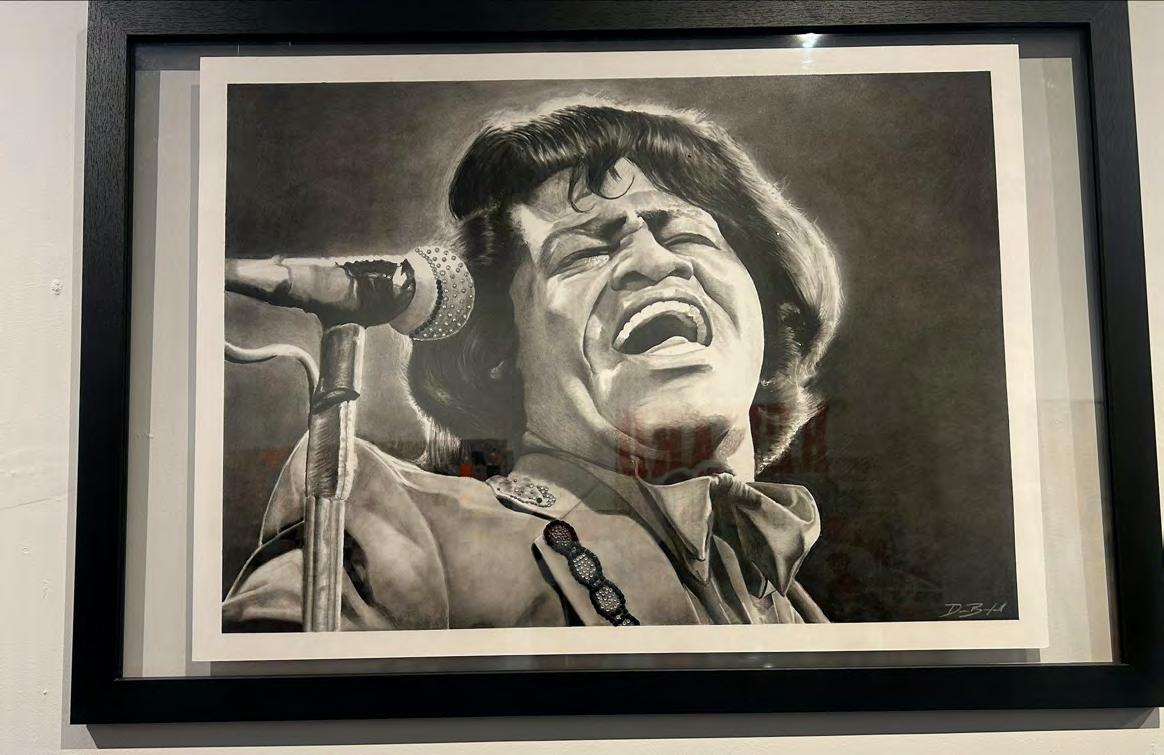

Dean Beresford from Clayton County, was also among one of the artists submitting for the exhibit. Upon the initial invitation to submit a piece for the exhibit, his immediate thought was to capture James Brown's dynamic stage
presence. Recognizing Brown as one of the greatest entertainers of all time and the Godfather of Soul, Beresford felt compelled to depict him performing with all the intensity and passion he was known for. Over 60 hours,
Beresford transformed a carefully selected reference photo into a stunning pencil drawing, enhanced with rhinestones and stones to add an extra pop. “I wanted to do a piece that just invoked him, performing, singing his heart out, and just using that to showcase my skills and my pencil drawings,” said Beresford.
Dr. Yamma Brown, a clinical pharmacist, and James Brown’s daughter, expressed deep pride in seeing her father's legacy celebrated in such a meaningful way. Dr. Brown highlighted how the exhibit honors her father’s monumental impact on music and serves as an inspiration for new generations of artists. “Atlanta is very near and dear to my heart because I've lived here for so many years, and it is a very richly rooted African American city, and has been for a long, long time. It's apropos for a city like this to be the city that gives back to my dad,” said Dr. Brown. Heather Hayes, a close friend of Dr. Yamma Brown and daughter of legendary musician Isaac Hayes, shared her thoughts on the exhibit. Hayes, who danced for James Brown for six years starting in 1995, described the experience as a profound blessing. She recounted their first meeting at a show, where she hid her identity for the first six months, auditioning under her mother’s maiden name.“Once he found out, he was like, ‘You should have told me Isaac was your daddy. I know your dad,’ ” Hayes shared. This discovery brought Hayes closer to Brown and his family; their bond growing stronger during rehearsals. “If Yamma would come on the road and she would want to go out, he would only let her go out with me,” Hayes recalled. The exhibit is open through June 30.
The Atlanta Washerwomen's Strike of 1881 was a real-life historical event in Atlanta’s history. Just weeks before the International Cotton Exposition, black laundresses took a stand for their rights. This strike became one of the most significant interracial labor strikes in post-Civil War America.
On Saturday, June 8, the Synchronicity Theatre in Midtown Atlanta hosted the opening night of "The Wash," a joint effort with Impact Theatre from Hapeville. The play, set in July 1881, tells the story of the primarily Black Atlanta washerwomen's strike to fight unfair wages and treatment. The show, running a little more than two hours (including an intermission), is woven together via the set design that the stage hosts. The show's creative transitions, enhanced by the clothing line's stage prop, allowed for multiple scene changes with the simple pull of a curtain.
The show speaks not only about the labor strike struggle but also intersects with the personal lives of the six women depicted, showcasing themes of domestic abuse, spirituality, and the LGBTQIA+ struggle in the 19th century. Cast member of "The Wash," Kenedi Deal, provided insights into the per-

Actress Tanya Freemen (far left) plays shop owner Anna in the opening scene of The Wash, a retelling of the Atlanta Washerwomen’s Strike of 1881 where Black laundresses took a stand for their rights just weeks before the International Cotton Exposition. Photo by Noah Washington/ The Atlanta Voice
sonal connections with her role and the inspiration behind the performance, citing the extensive research and dramaturgical support provided during the production. Deal said she felt a strong personal connection to her character Jewel and drew much of her inspiration from her own life experiences and family background, saying, "It is hard to find mixed-race, ethnicity roles, but to find something that is so close and hits so home for me is rare." Deal found Jewel's narrative particularly resonant, appreciating the character's quirks and flaws.
Playwright Kelundra Smith emphasized the significance of "The Wash" in reclaiming historical and cultural foundations that have been suppressed. About why she wrote it, she stated, "This story, to me, is so important because one of the ways that I think white supremacy and oppression work is to make us believe that we constantly have to start over when you don't think you have a firm foundation. You don't think you have a blueprint." The show was conceived in 2023 after a one-week workshop. It will run until June 30th at the Synchronicity Theatre before re-
suming at Impact Theatre in Hapeville on July 11th and running through July 28th. "Black people in this country have rich and fertile ground. Workers in this country have rich and fertile ground, and we need to know that the power is ours. We've had it, and it's time to reclaim it," Smith continued.
The show’s comedy-footing and serious subject matter often held its opening night audience in hysterical laughter.
Director Brenda Porter discussed her motivations and the impact of directing "The Wash." When asked about her decision to take on this work, Porter explained, "When I first read this piece, I was intrigued by the women and the writing that Kelundra did. She's a beautiful writer, and I had never heard the story, and I was just intrigued by these women who, in such a short time, were able to gather so many women together and make a big change."
Porter highlighted the historical significance and the personal inspiration she drew from the story. She expressed her fascination with the women's ability to mobilize and create substantial change despite the societal constraints of their time. "They were American women from the South, from Atlanta," Porter continued.
To purchase tickets, visit Synchronicity Theatre.
Clark Atlanta University (CAU) recently announced its selection as an Institute Partner for the 2024 Mandela Washington Fellowship for Young African Leaders.
Beginning June 19 – July 28, CAU will host 25 of Africa’s bright, emerging Business leaders for a six-week Leadership Institute, sponsored by the U.S. Department of State.
The Mandela Washington Fellowship, is celebrating 10 years of being the flagship program of the Young African Leaders Initiative (YALI), empowers young African leaders through academic coursework, leadership training, mentoring, networking, professional opportunities, and local community engagement.
YALI was created in 2010 and supports young Africans as they spur economic growth and prosperity, strengthen democratic governance, and enhance peace and security across Africa.
Established in 2014, the Mandela Washington Fellowship is celebrating its tenth anniversary in 2024. Since its inception, nearly 6,500 young leaders from every country in Sub-Saharan Africa have participated in the Mandela Washington Fellowship.
The cohort of Fellows hosted by Clark Atlanta University will be part of a group of 700 Mandela Washington Fellows hosted at 28 ed-
ucational institutions across the United States.
CAU’s Dr. Darlita Moye said the Mandela Washington Fellowship was a program which started during the Obama administration and essentially is a program that brings over roughly 700 fellows from across the continent, in different countries in Africa every year.
There are three tracks: Civic engagement, public management, and leadership in business.
“Clark Atlanta University has the leadership in business track, and it is housed in the School of Business. So essentially, what we do here is we put together a curriculum that is rigorous, and we show them the best practices around business and leadership,” Moye said.
Additionally, Moye said they connect them on experiential learning visits to places like UPS, Coca Cola, and IBM. Last year, she said, they went to Google and this year they will be visiting Microsoft, so the fellows can see firsthand how they can apply what they’re learning in the classroom to what businesses are doing today.
She said they also focus on the social and cultural components by taking the fellows to various sites like the Martin Luther King Jr. Center, the Herndon Home, the Carter Library, the aquarium, and the Coca Cola Museum.
“We asked them to participate in commu-
nity service, where they're actually given back in the city of Atlanta, places like mad-share, places like Atlanta Community Food Bank and also trees,” she said. “What that does is it gives them a very well-rounded approach to how we’re doing things at HBCUs and how the community as a whole in Atlanta views community service.”
Furthermore, the fellows' range between the ages of 25 and 35. Moye says they’re hoping what they do is take back these best practices of those things so they can become community leaders, start a business, create a business, or scale their existing businesses.
“We're providing a six-week intensive program that will help them achieve that goal,” she said. “We're hoping it will have what we consider to be the multiplier effect, and they will be able to grow and create jobs within their community.”
This is the 10th year CAU has been doing this, according to Moye.
“We have been the only HBCU from the very beginning that is still here today. There are others, but we've been here the whole 10 years,” she said.
Since 2014, CAU has hosted 250 Fellows from the continent to connect with local partners-City of Atlanta, IBM, UPS, Coca Cola and Google through site visits, collaborative projects, and forums. Additionally,
Fellows will give back to the community through service opportunities with local partners, such as Atlanta Community Food Bank, Med Share International, Trees Atlanta, Peachtree Road Race and more.
Following the reception and during their 6-week stay, the Fellows will participate in speed networking, small group sector, social/cultural events and more.
After their Leadership Institutes, Fellows will participate in the Mandela Washington Fellowship Summit, in Washington, D.C. where they will take part in networking and panel discussions with each other and with U.S. leaders from the public, private, and nonprofit sectors.
Following the Summit, up to 100 competitively selected Fellows will participate in four weeks professional development with U.S. non-governmental organizations, private companies, and government agencies.
Funded by the U.S. Department of State’s Bureau of Educational and Cultural Affairs and implemented by IREX, Leadership Institutes will offer programs that will challenge, motivate, and empower young leaders from Africa to tackle the challenges of the 21st century.
For more information, visit https://www. mandelawashingtonfellowship.org.
Black Republican Byron Donalds has come under fire for saying that “during Jim Crow, the Black family was together.”
The Florida congressman made the remarks at a “Black Americans for Trump” event in “one of the whitest and most conservative parts” of Philadelphia on Tuesday that featured cigars, cognac, and out-of-towners, but no Black speakers from Pennsylvania.
House Democratic Leader Hakeem Jeffries responded by suggesting that Donalds was making a “factually inaccurate statement that Black folks were better off during Jim Crow” and cited a number of historical examples to disprove that claim.
Donalds replied by accusing Jeffries of lying about his remarks. “What I said was you had more Black families under Jim Crow,” Donalds argued.
So, who’s telling the truth here?
First, Jim Crow was the era between 1877 and 1964 when Black people were racially segregated by law in America. The total Black population was only 18.9 million in 1960 compared to 47 million today, so it’s technically impossible that there were “more Black families under Jim Crow.”
Second, Donalds actually seems to be making the conservative paternalistic argument that non-marital Black families aren’t really families. But who gave him the authority to decide what constitutes a Black family?
Third, Donalds’ claim that the Black family was “together” during this period repeats a popular myth of conservative nostalgia. I wrote about this myth in my latest book, “Why Does Everything Have to Be About Race?” I tell the story of 14-year-old George Stinney, Jr., who was raised in a working, church-going Black family in 1940s South Carolina. Stinney was wrongly accused of murdering a white girl but was convicted by an all-white male jury that took just 10 minutes to decide his fate.
The 14-year-old Black boy was sentenced to death and executed just weeks after he was arrested. Although Stinney’s parents did everything this country expects of Black families, they could not protect their child from white supremacy and state-sanctioned racial terrorism.
That’s what makes the contemporary romanticization of Black family history so disturbing. Were Black families “together” when the Scottsboro Boys were wrongly accused of raping a white woman in 1931? Or when 14-year-old Emmett Till was lynched in 1955? Or when four Black girls were murdered in a church bombing in Alabama in 1963?
The conservative argument echoes a common refrain from Black Republicans who want to “make America great again.” “Fatherless families are one of the primary root causes of Black Americans’ current socioeconomic challenges,” according to former Indi-
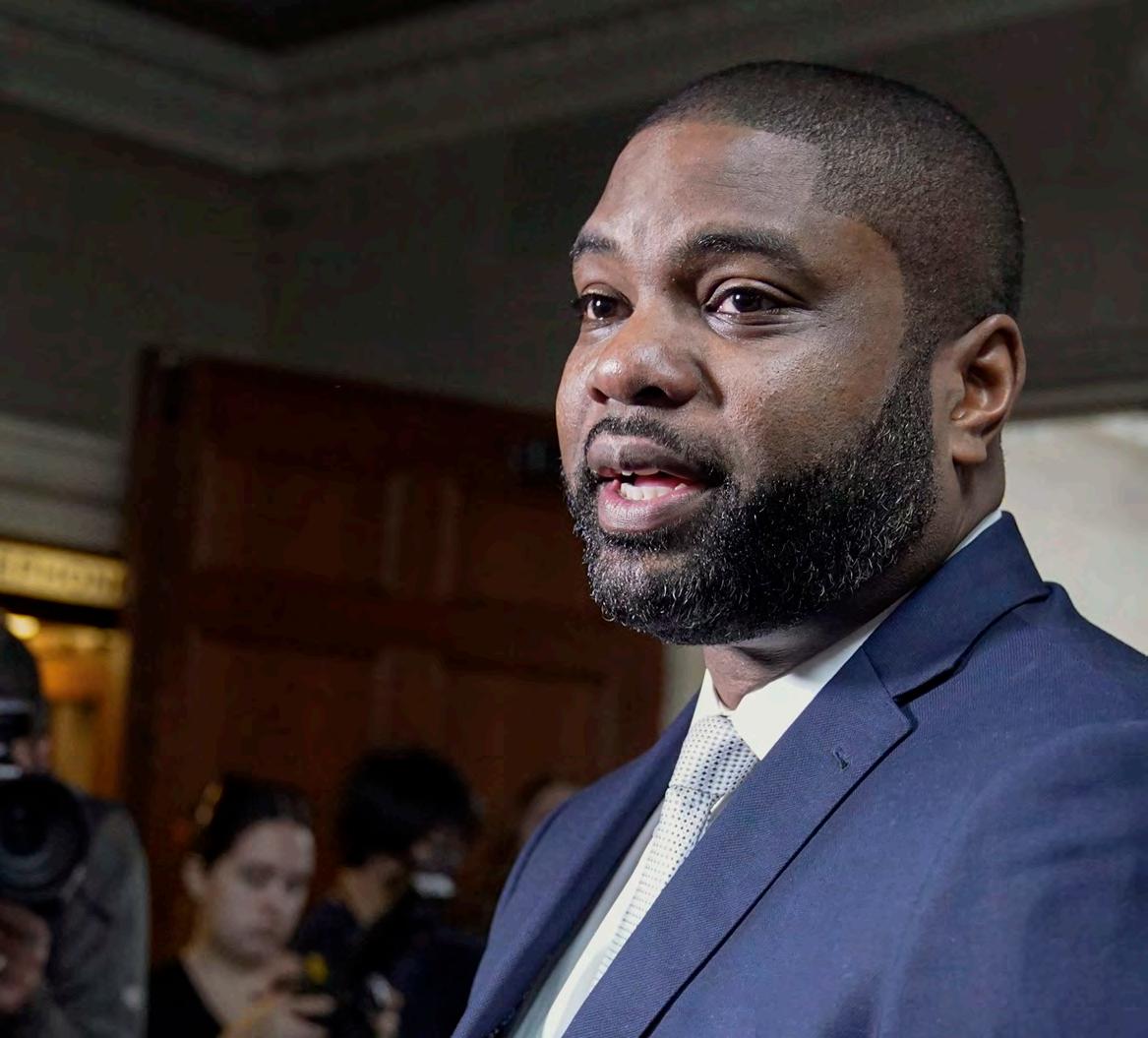
ana Attorney General Curtis Hill. If that were true, then what was the cause of rampant Black poverty and unemployment before these so-called “fatherless families”?
Contrary to stereotype, research has shown that Black fathers are actually more engaged with their children than we’re led to believe. A CDC report found that Black men were more likely than white men to bathe, dress, diaper, or eat meals with their children. And a Pew Research Center study found that Black fathers who don’t live with their children were more likely than white fathers to visit their children on a regular basis.
Donalds, who has been desperately campaigning to be Trump’s running mate, claims that “Democrat policies under HEW, under the welfare state” helped to “destroy the Black family.” First, let’s be clear. HEW, the U.S. Department of Health, Education, and Welfare, was started in 1953 under Republican President Dwight Eisenhower. And
history indicates that white Americans had much less of a problem with government programs — from Social Security to the GI Bill to Medicare — when white people were the designated beneficiaries.
Second, the policies that Donalds attacks are the very policies that have helped Black families since the 1960s. As author Clay Cane noted in response to Donalds, the Black poverty rate in America fell from 55% during the Jim Crow year of 1959 to a record low of 17% in 2022. And even more recently, President Obama’s Affordable Care Act, another Democratic policy, reduced the rate of Black people without health insurance from 20% to 10% in just over 10 years.
Donalds follows the predictable Republican logic used from Ronald Reagan to the present that has tried to shift the burden of America’s problems from government and society to individuals and families. To do this, they deny or diminish the significance of structural racism, sexism, and
inequality, and perpetuate outdated myths of Black inferiority.
From slavery to segregation to the present, Black families have been under social, political, and economic assault. The last thing our families need is Republicans blaming us for the problems that society helped to create.
“Black Vote, Black Power,” a collaboration between Keith Boykin and Word In Black, examines the issues, the candidates, and what’s at stake for Black America in the 2024 presidential election.
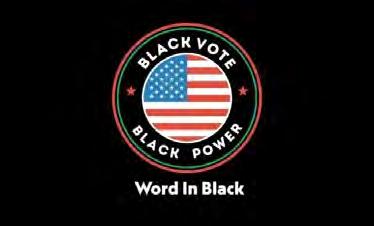

ORLANDO, FL.- Walt Disney World’s newest attraction, Tiana’s Bayou Adventure, is almost here. Based on Disney’s 2009 film “The Princess and the Frog,” the ride has transformed the former Splash Mountain attraction into a love letter to Disney’s first Black princess and New Orleans. Featuring a 50-foot drop, animatronics thanks to the minds of Disney’s Imagineers, and the sounds of the beloved movie soundtrack along with new music, the Magic Kingdom ride takes guests on a journey that digs a little deeper into the lives of Princess Tiana and Prince Naveen a year after the film.
“Tiana was our inspiration because Tiana is everybody's princess. She comes from a real place in America. She wasn't born into royalty. She has a working mom. She has military ties, and so much about her life is relatable,” said Charita Carter, the executive creative producer of Walt Disney Imagineering, at a showcase. “Everyone can find an aspect of the story in their own story. And so many people are inspired by her. Tiana is a dreamer and a doer.”
At the start of the ride, guests can wander through the main office of Tiana’s Foods— an employee-owned cooperative she started after the success of Tiana’s Palace—as she prepares to throw a Mardi Gras party for all of New Orleans. The queue is littered with Easter eggs and mementos highlighting the restaurant’s success, from winning Best New Restaurant to inspiring young locals.
Guests are then taken to the kitchen, which is filled with framed photos of family and friends. Ted Robledo, the executive creative director of Disney Imagineering, also revealed that the space will be pumped with the smell of fresh beignets, further immersing people in Tiana’s world.
The ride relies heavily on storytelling that draws from elements of the movie and real-life inspirations as well. Leah Chase inspired the character of Tiana. Known as the “Queen of Creole Cuisine,” she was an award-winning chef and the culinary legend behind Dooky Chase as we know it. A New Orleans staple, Dooky Chase became a gathering spot for many after she took over the restaurant with her husband, Edgar “Dooky” Chase II, in 1946.
That inspiration carried on into Tiana’s Bayou Adventure. The executive team behind the ride took many research trips to New Orleans and visited the Chase family as they worked to continue their family legacy.
“Tiana would not have been possible if it had not been for Leah Chase. She was a dreamer and a doer — a working mom of four who followed her dream to run a restaurant,” said Carmen Smith, senior vice president of creative development for Walt Dis-

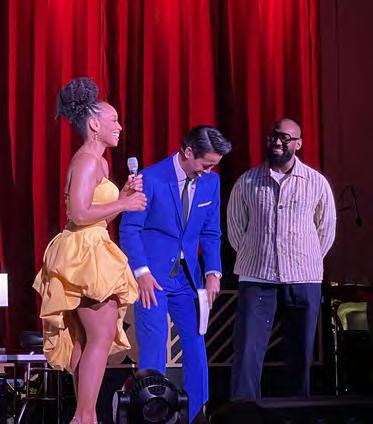

ney Imagineering. “Though Leah and Dooky are gone, their legacy lives on in the future generations who are a huge part of this project. Their children were our guides to her life and her community.”
Fans of the film are reunited with beloved characters such as Mama Odie, Louis the Alligator, Charlotte La Bouf, Tiana’s mother, Eudora, and Prince Naveen’s younger brother Prince Ralphie throughout the water ride. Many new critter characters are also introduced through dozens of brand-new audio-animatronics.
The ride ends with a big musical number featuring a new song from Grammy award-winning musician and songwriter PJ Morton and the voice of Tiana Anika Noni Rose titled “Special Spice.”
They express how glad they are to welcome everyone to their “joyful celebration” that needs “no invitation.”


Atroubling trend is emerging.
Black children from low-income families are starting puberty earlier than their peers, potentially setting them on a path toward poorer health outcomes. This concerning finding comes from a recent study by Harvard T.H. Chan School of Public Health’s Apple Women’s Health Study.
The JAMA Network study examined data on over 71,000 individuals born between 1950 and 2005. Across all demographics, the average age of first menstruation (menarche) is dropping. However, the trend is particularly sharp for racial minorities and children from lower socioeconomic backgrounds, with Black children experiencing the earliest onsets of puberty.
This earlier initiation of puberty isn’t the only concern. The study also suggests that Black children and those from disadvantaged backgrounds experience longer delays in establishing regular menstrual cycles. Medical professionals warn that both early menarche and irregular periods can be indicators of potential health issues down the line.
Lead researcher Zifan Wang told The Washington Post that she found it alarming that females were taking longer to experi-
Sports
ence normal menstrual cycles.
“This is especially troubling because irregular cycles are a major predictor of unfavorable health outcomes later in life. We are concerned about it,” Wang told the Post. “We need to provide early counseling and intervention on irregular cycles in children and adolescents more often.”
Early menarche and irregular periods can signal physical and
psychosocial problems later in life.
The reasons behind this phenomenon are complex and need to be fully understood. Some theories suggest environmental factors like exposure to chemicals that mimic hormones play a role. Socioeconomic factors, such as chronic stress and limited access to healthy foods, could also be contributing influences. Environmental problems such as financial instability or racism may also cause stress.
Studies have linked early menarche to an increased risk of breast cancer, certain types of ovarian cancer, and metabolic issues like type 2 diabetes later in life. Irregular periods can also be associated with fertility problems and hormonal imbalances. If a person’s cycle is routinely shorter than 28 days, they should consider reporting the change to their healthcare professional, even if it still seems like a “normal” cycle. The data provides vital information about a patient’s health, including possible endocrine and reproductive problems, for healthcare providers.
The study had certain limitations, and the researchers cautioned that the findings would not affect all menstruating Americans. They stated that participants’ voluntary participation in the study could lead to potential selection bias.
On Saturday, June 22 St. Louis SC will host Atlanta United. The match will be the first time the two teams will have met this season. Atlanta will come into the match having won 1-0 on the road in D.C. on Wednesday, June 19. The goal was scored by Thiago Alamada midway through the second half. Atlanta United will return home to face Toronto FC on the following Saturday, June 29 (7:30 p.m.).
On Saturday, June 15, the first match of the 2024 season for new interim head coach Rob Valentino began with a goal from a former Atlanta United player in the fourth minute of the match. Former Atlanta defender Franco Escobar headed in a Houston miss to give the road team a 1-0 advantage. It would end with Atlanta United in a similar position to where it was before Valentino took over for former manager Gonzalo Pineda: with a draw at home. The loss extended the home winless streak to seven matches.
United drew 2-2 with Houston on Saturday night after being ahead 2-1 for nearly the entire second half. There were boos coming from the crowd of more than 42,600 following the final whistle.
The match would be tied in the 25th min-

ute however when a long pass from goalkeeper Brad Guzan was picked up by reserve Luke Brennan, who was in the game as an injury replacement for Edwin Mosquera, and
resulted in multiple shots-on-goal for Atlanta. The latter of the two shots being a straight on goal from Rios, who was in the starting lineup at forward in place of the outgoing Giorgos Giakoumakis. The goal is Rios' second of the season in seven matches.
The decision of bringing Brennan into the match belongs to Valentino, who knows this team well after having been involved as an assistant coach and interim head coach since 2018. Brennan, a member of the Atlanta United academy, immediately changed the energy on the wings upon entering the match.
After the match Valentino had nothing but positive things to say about the way Brennan played. "He didn't start the game and all of a sudden 18 minutes in he had to step in and I think what Lukey did was awesome," said Valentino. "He showed bravery, he went at them like a nuisance and I felt like he caused them a lot of problems. That’s great to see.”
"You never know when your moment comes," Valentino added.
During the three minutes of first half stoppage time Houston saw a number of solid opportunities to take back the lead and missed them all. The Dynamo had six shots on target during the first half to Atlanta's three.
Atlanta got off to a strong start during the second half with a goal from Xande Silva in the 55th minute on an assist from Caleb Wiley. Thiago Almada nearly scored Atlanta's third goal of the match in the 65th minute on a driving shot from 20 yards away. Atlanta had the momentum following Silva's goal. Houston midfielder Latif Blessing scored his fourth goal of the season and tied the match in the 89th minute following an Atlanta defensive breakdown. For the entire second half to that point there was string play in the back for Atlanta, particularly from Wiley and Guzan, who had a number of saves.
Welcome back: Last Saturday, Franco Escobar was greeted with a warm welcome back to Atlanta from the fans that were trickling into Mercedes-Benz Stadium an hour before the start of the match Saturday night. The Houston Dynamo defender and Argentinian national had been with the team for the 2018 MLS championship. As a welcome gift Escobar earned a yellow card in the 42nd minute to go along with the goal he scored. Honor: Coy Dumas, Jr., the longest serving MARTA employee hammered the golden spike before the match last Saturday night. Dumas spent 50 years with MARTA as a bus driver.
If you want a midsize SUV that is elegant, reliable, provides a plethora of standard features, and is revered globally, Hyundai’s 2024 Palisade should be at the top of your short list. Garnering awards in virtually all categories, including value, safety, and overall standing at the top of its class, and since entering the market in 2020, this year’s version maintains praise.
Starting at around $36,000, the Palisade comes in five trims— SE, SEL, XRT, Limited, and the top-of-the-line Calligraphy—but all still provide a pampering ride for up to eight passengers. The 3.5-liter V6 engine delivers a respectable 291 horsepower, orchestrated with an eight-speed automatic transmission and paddle shifters. Other features include dual-zone automatic climate control; 20-inch alloy wheels; a 12.3-inch touchscreen; navigation; Bluetooth; Apple CarPlay and Android Auto; USB ports in all three rows; and a Wi-Fi hot spot to especially keep the kids occupied. The ride is smooth and responsive, and the

maneuverability can get even more impressive with the all-wheel drive option I enjoyed. And just as elegant and graceful as the writing form of calligraphy is known to be, the model I reviewed justified its monicker starting at just over $52K and well worth every penny. Stepping things up a notch, this model boasts Nappa leather throughout the interior; a digital rearview mirror; hands-free liftgate;
roof rails; dual-pane sunroof; heated, power-folding third-row seats; a Harman Kardon sound system; and what the driver will truly appreciate—an Ergo-Motion seat with massaging capability in case eyelids get heavy on long trips. There are also some standout safety features to ease the mind, including reverse collision warning and reverse automatic emergency braking. The remote Smart
Parking, which is ideal for tight spaces, is also a plus. Storage space when folding down the captain’s chairs in the second row adds up to 86.4 cubic feet.
As a tradition by this point, Hyundai’s 10-year/100,000-mile powertrain warranty is also intact, so no worries there when it comes to getting the best bang for the buck. All in all, the Palisade SUV is a winner regardless of the version you decide, but going all the way with the Calligraphy is highly recommended. Note that there is now the Calligraphy Night version as well, which makes this vehicle stealthier with numerous embellishments in black, including the wheels, roof rails, and leather interior. Whatever version you choose, the Palisade SUV is yet another high mark on Hyundai’s stellar roster.
Fuel Economy: 19 city/24 highway/21 combined
Price: $52,100 MSRP, and $53,650 including carpeted floor mats, handling, processing and delivery as reviewed.
For more information, visit Hyundaiusa. com

